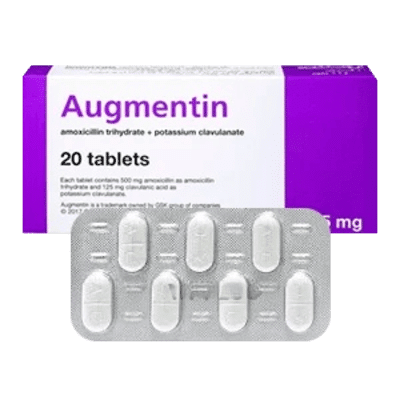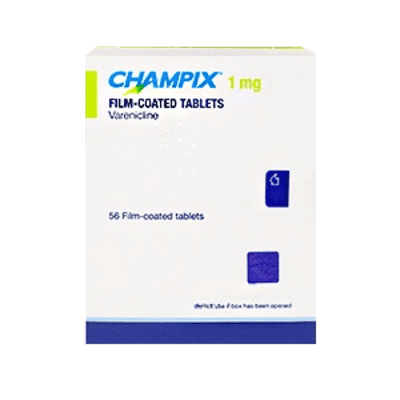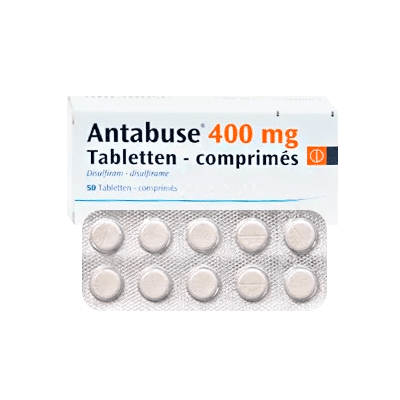I used Augmentin as prescribed by my doctor to treat a respiratory infection. The results were immediate; I felt significant relief within a few days. I was pleasantly surprised by the lack of serious side effects often associated with other antibiotics.

Augmentin
- Quality products
- Support 24/7
- Fast delivery
About this medicine
Augmentin is a broad-spectrum antibacterial drug that effectively kills bacteria. It is designed to combat a variety of microorganisms, both aerobic (those growing in oxygen-rich environments) and anaerobic (those growing in oxygen-depleted environments), including gram-positive and gram-negative aerobic bacteria, as well as strains that produce beta-lactamases—enzymes that destroy penicillin. Augmentin contains potassium clavulanate, which inhibits the activity of beta-lactamase-producing bacteria. This drug is used to treat pneumonia and other infectious diseases of the respiratory tract, gastrointestinal tract, genitourinary tract, postoperative infections, and many others.
Composition of the medicine
Augmentin contains active and auxiliary components that provide antibacterial action. The main active ingredient is amoxicillin, a penicillin antibiotic, which, when exposed to potassium clavulanate, becomes more resistant to bacterial enzymes. The combination of these substances enhances the drugs effectiveness.
- Amoxicillin is the main antibiotic that fights bacteria.
- Potassium clavulanate provides resistance to bacterial enzymes.
- Additional components promote proper absorption and distribution of active ingredients throughout the body.
The presence of clavulanate allows Augmentin to remain a potent agent against microorganisms that are typically resistant to other antibiotics.
Usage and dosage
When using Augmentin, it is necessary to strictly adhere to the dosage and regimen prescribed by your doctor, based on the severity of the patients condition, the location of the infection, and the nature of the pathogen. Failure to follow these recommendations may lead to adverse effects. The tablet should be swallowed whole, without chewing, and, if possible, with food to reduce stomach irritation.
- Take the medication at the intervals prescribed by your doctor, spreading the doses evenly throughout the day.
- If using chewable tablets, they can be chewed before swallowing.
- The duration of treatment is determined individually and should not exceed the recommendations of your healthcare professional.
It is important not to extend the duration of Augmentin use without your doctors approval, as this may cause side effects or an allergic reaction.
How does this medicine work?
Augmentins mechanism of action is based on two active ingredients: amoxicillin and potassium clavulanate, which work together to combat a broad spectrum of bacterial infections. Amoxicillin disrupts bacterial cell wall synthesis, leading to bacterial destruction and death, while clavulanate prevents amoxicillin from being broken down by bacterial enzymes, providing prolonged antibiotic action.
This combination makes Augmentin effective against a variety of microorganisms, including those typically resistant to other antibiotics. The drugs action begins shortly after administration and continues to work, providing a therapeutic effect that helps fight infection.
Another important aspect of Augmentins action is its ability to prevent the development of bacterial resistance, a significant advantage in the treatment of infections resistant to standard antibiotic therapy.
Indications for use
Augmentin is indicated for a wide range of infectious diseases. It is prescribed when it is necessary to combat resistant microorganisms. Its formula allows it to eliminate even complex infections.
- Respiratory tract infections, including pneumonia and bronchitis.
- Bile tract inflammation, such as cholecystitis and cholangitis.
- Genitourinary tract infections, including pyelonephritis and cystitis.
- Skin and soft tissue infections, such as furunculosis and abscesses.
- Infections caused by surgery or trauma.
Augmentin demonstrates high efficacy in treating a wide range of diseases due to its unique formula.
Contraindications for use
Although Augmentin is a potent antibiotic, its use has a number of contraindications that must be considered before initiating therapy. Ignoring these contraindications can lead to serious consequences, so it is always necessary to consult a healthcare professional before starting treatment.
- A history of allergic reactions to penicillin antibiotics.
- Severe liver or kidney dysfunction.
- A history of liver disease caused by previously used medications.
- Use during pregnancy, especially in the third trimester, and during lactation, without a doctors recommendation.
- Monoculosis and its manifestations in the patient.
It is important to discuss all current and past medical conditions with a doctor before starting treatment with Augmentin to avoid potential complications.
Side effects
Like many other antibiotics, Augmentin can cause a number of side effects. These side effects can vary in severity and affect different body systems. It is important to closely monitor your condition and seek medical attention if necessary.
- Digestive upsets such as nausea, vomiting, and diarrhea.
- Allergic reactions, such as rash or hives.
- Yeast infections due to a microflora imbalance.
- Dizziness or headache.
- Changes in liver function, including elevated liver enzymes.
- Rarely, severe allergic reactions such as angioedema or anaphylactic shock.
If side effects occur, it is important to stop taking the medication immediately and consult a doctor for treatment adjustments or the selection of alternative medications.
Frequently asked questions
Augmentin Reviews and Experiences
The medication helped overcome an infection that other medications had failed to combat. However, after a couple of days, mild nausea and dizziness set in, and I had to reduce the dosage after consulting with my doctor. Otherwise, the treatment was a positive experience, although I had to suffer from abdominal discomfort for a week.
Ive always been wary of antibiotics due to allergies, but Augmentin worked wonders. A small rash appeared on the second day, but it quickly went away. The doctor said it was a normal reaction. I recommend checking with your doctor about all the details before starting treatment.








